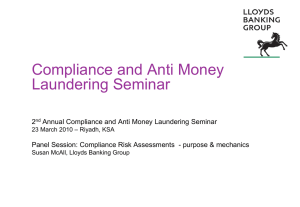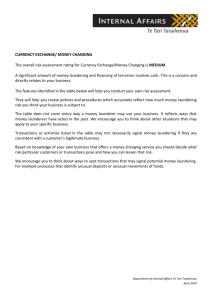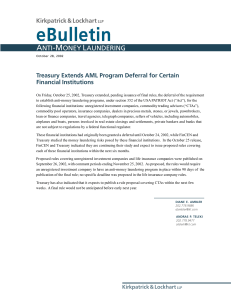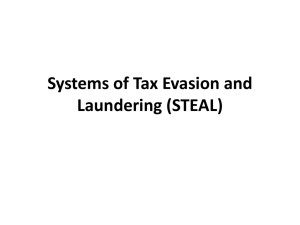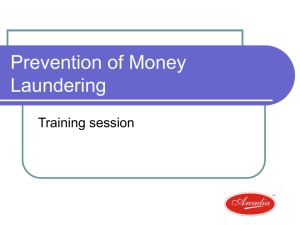USA PATRIOT ACT -- MONEY LAUNDERING AND ASSET FORFEITURE
advertisement
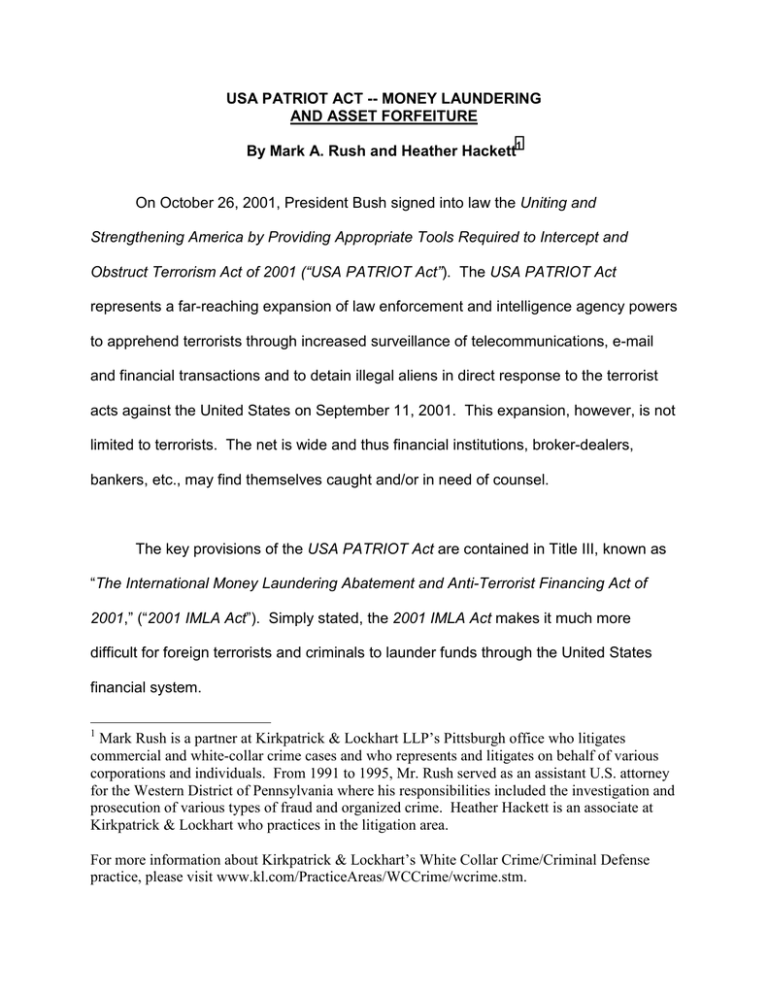
USA PATRIOT ACT -- MONEY LAUNDERING AND ASSET FORFEITURE By Mark A. Rush and Heather Hackett1 On October 26, 2001, President Bush signed into law the Uniting and Strengthening America by Providing Appropriate Tools Required to Intercept and Obstruct Terrorism Act of 2001 (“USA PATRIOT Act”). The USA PATRIOT Act represents a far-reaching expansion of law enforcement and intelligence agency powers to apprehend terrorists through increased surveillance of telecommunications, e-mail and financial transactions and to detain illegal aliens in direct response to the terrorist acts against the United States on September 11, 2001. This expansion, however, is not limited to terrorists. The net is wide and thus financial institutions, broker-dealers, bankers, etc., may find themselves caught and/or in need of counsel. The key provisions of the USA PATRIOT Act are contained in Title III, known as “The International Money Laundering Abatement and Anti-Terrorist Financing Act of 2001,” (“2001 IMLA Act”). Simply stated, the 2001 IMLA Act makes it much more difficult for foreign terrorists and criminals to launder funds through the United States financial system. 1 Mark Rush is a partner at Kirkpatrick & Lockhart LLP’s Pittsburgh office who litigates commercial and white-collar crime cases and who represents and litigates on behalf of various corporations and individuals. From 1991 to 1995, Mr. Rush served as an assistant U.S. attorney for the Western District of Pennsylvania where his responsibilities included the investigation and prosecution of various types of fraud and organized crime. Heather Hackett is an associate at Kirkpatrick & Lockhart who practices in the litigation area. For more information about Kirkpatrick & Lockhart’s White Collar Crime/Criminal Defense practice, please visit www.kl.com/PracticeAreas/WCCrime/wcrime.stm. In recognizing that stronger anti-money laundering laws were needed to further limit foreign money laundering into the United States, Congress specifically found that the 2001 IMLA Act was necessary because (1) “effective enforcement of currency reporting requirements * * * has forced * * * criminals * * * to avoid using traditional [United States] financial institutions * * * [and] move large quantities of currency [which] can be smuggled outside the United States” (2001 IMLA Act, ¶371); (2) certain non-U.S. “offshore” banking systems provided weak financial supervision and strong anonymity protection — essential tools to disguise the ownership and movement of criminal funds (2001 IMLA Act, §302(a)(4)); (3) certain correspondent banking facilities have been used by foreign banks and “private banking” arrangements have been used by criminals to “permit the laundering of funds by hiding the identities of real parties in interest to financial transactions” (2001 IMLA Act, §302(a)(6-7)). To address these problems, Congress decided it was imperative inter alia that: (a) those foreign jurisdictions, financial institutions, accounts or transactions that “pose particular, identifiable opportunities for criminal abuse” and therefore are of “primary money laundering concern” be subjected to “special scrutiny” when dealing with U.S. financial institutions; (b) the Secretary of the Treasury be given broad discretion to deal with money laundering problems presented by foreign jurisdictions, financial institutions, accounts or transactions; and (c) the most common form of money laundering — the smuggling of cash in bulk — needed strong criminal penalties and forfeiture remedies (2001 IMLA Act, §302(b) and 371(b)). The 2001 IMLA Act addresses all of these issues. 2 KEY PROVISIONS The most important provisions of the 2001 IMLA Act are that it: • gives the Secretary of the Treasury broad discretion to identify foreign jurisdictions, financial institutions, transactions and/or accounts that are of “primary money laundering concern;” • allows the Secretary to require U.S. financial institutions, including banks, investment companies and broker/dealers, to undertake certain “special measures” towards these “areas of primary money laundering concern,” such as enhanced record keeping, identification of beneficial owners or customers, or prohibitions or conditions on opening and maintaining certain accounts; • requires financial institutions, such as banks, investment companies and broker/dealers, that establish, maintain, administer or manage private banking accounts or correspondent accounts for non-U.S. persons to establish appropriate, specific and, where necessary, enhanced due diligence policies, procedures and controls that are reasonably designed to detect and report instances of money laundering through these accounts; • requires financial institutions to improve their verification of account holders and to enhance their money laundering practices and procedures; and • prohibits the bulk smuggling of cash. APPLICABILITY OF 2001 IMLA ACT The 2001 IMLA Act attempts to limit the money laundering activities of certain high-risk foreign persons directed against the United States by making it burdensome for domestic financial institutions to deal with such persons. Most of the compliance requirements of the 2001 IMLA Act are imposed upon domestic “financial institutions.” Although an initial reading of the 2001 IMLA Act appears to suggest that the only “financial institutions” covered by the Act are banks, such is not the case. The definition of “financial institution” in 31 U.S.C. §5312(a)(2) is very broad and includes not only banks and thrift institutions but also broker/dealers, commodity dealers, investment companies, insurance companies, investment banks, credit unions, money transmitters and most types of businesses which deal with the delivery of financial services. 3 Generally, the new provisions are applied first to depository institutions, which are presently subject to the broadest anti-money laundering regulations, and then over a six- to twelve-month period to broker/dealers and investment companies. (See, e.g. 2001 IMLA Act, §357.) A “PRIMARY MONEY LAUNDERING CONCERN” The laundering of tainted money from less-advanced or uncooperative countries into the industrialized countries is a significant problem in the fight against terrorism. Recognizing that we now have a global economy and the jurisdictional reach of U.S. law cannot reach into other uncooperative sovereign nations, the key section of the 2001 IMLA Act attempts to attack the foreign gaps in U.S. money laundering control system by allowing the Secretary of the Treasury to designate a jurisdiction outside of the United States, one or more financial institutions operating outside the United States, one or more classes of transactions within or involving a jurisdiction outside the United States, or one or more types of accounts as a “primary money laundering concern.” (2001 IMLA Act, §311). This determination is at the discretion of the Secretary of the Treasury, although consultation with the Attorney General and Secretary of State is required. The Secretary is required to take seven factors into account when he designates a jurisdiction as a “primary money laundering concern”: (i) the presence of terrorists or organized crime in the jurisdiction; (ii) the jurisdiction’s use of bank secrecy and tax benefits for nonresidents; (iii) the presence of money laundering laws; (iv) the volume of transactions in relation to the size of the economy; (v) whether international anti-money 4 laundering organizations characterize the jurisdiction as a money laundering haven; (vi) the history of cooperation in previous money laundering cases; and finally, (vii) the presence of internal corruption. Once a jurisdiction is deemed a “primary money laundering concern,” the Secretary may require domestic financial institutions to comply with any or all of the following five “special measures.” First, the Secretary may require that a financial institution dealing with a “primary money laundering concern” keep “know your customer”-type records detailing who owns the account, their address, the originator of the funds in the account, the identity of any beneficial owners, and a record of all account transactions. Second, the Secretary may require that any accounts held by a financial institution on behalf of a foreign entity which has been deemed a “primary money laundering concern” contain detailed records regarding the financial owners of that account. Third, the Secretary may require a financial institution to keep paythrough accounts for a bank in a jurisdiction deemed a “primary money laundering concern” to determine the identity of each customer who is permitted to use the account, and other information that it would be required to obtain had the account been opened for a U.S. citizen. Fourth, the same information required for pay-through accounts must also be obtained by financial institutions for the use of correspondent accounts. Finally, the Secretary, only through issuing a regulation, can prohibit the use, or shutdown, of an existing correspondent or pay-through account if he found the accounts were linked to a jurisdiction designated a “primary money laundering concern.” 5 Compliance with the “special measures” detailed above is the responsibility of any “financial institution” as defined in 31 U.S.C. §5312(a)(2). In other words, any financial institution conducting business with a primary money laundering concern (including a foreign bank chartered by a country which is a primary money laundering concern) must strictly follow “know your customer”-type rules and employ a heightened sense of due diligence when establishing these types of accounts to avoid potential problems with law enforcement or the Department of the Treasury. The burden of complying with such onerous requirements is likely to discourage most domestic financial institutions from doing business with foreign banks in countries designated by the Secretary as primary money laundering concerns. SECTION 312 – CORRESPONDENT AND PRIVATE BANKING ACCOUNTS — SPECIAL DUE DILIGENCE REQUIRED Section 312 of the 2001 IMLA Act requires any domestic financial institution with private banking or correspondent accounts in the United States for a “non-United States person” to establish “appropriate, specific, and, where necessary, enhanced due diligence policies, procedures, and controls that are reasonably designed to detect and report instances of money laundering through those accounts.” This requirement to establish “know your customer”-type due diligence policies and procedures applies to private banking or correspondent accounts maintained by a financial institution for any non-United States person and not just persons from countries designated as primary money laundering concerns. 6 Minimum due diligence procedures and controls on “private banking” accounts (i.e., having minimum aggregate deposits of funds or assets in excess of $1,000,000) obligate a financial institution to take “reasonable steps” to identify the nominal and beneficial owners of, and source of funds deposited to, the account. In addition, “enhanced scrutiny” is required on any private banking account maintained by a senior foreign political figure, their immediate family members or close associates to detect and report transactions that “may involve the proceeds of foreign corruption.” The Act does not specify what are satisfactory minimum due diligence policies for correspondent accounts. It does, however, require “enhanced” due diligence policies, procedures and controls for any correspondent account maintained by a foreign bank operating under an “offshore banking license” (i.e., chartered to conduct banking activities outside, but not in, the country in which it is chartered); or operating under a charter issued by a foreign country designated as a primary money laundering concern by the Secretary of the Treasury or as “non-co-operative” by an international anti-money laundering group of which the United States is a member (e.g., the OECD Financial Action Task Force on Money Laundering). If a financial institution is obligated to impose enhanced due diligence policies, procedures and controls on a particular correspondent account, it must fulfill three requirements. First, it must identify each of the owners of a non-publicly-traded foreign bank maintaining the correspondent account and discern the nature and extent of their ownership. Second, it must discover if the foreign bank is conducting correspondent 7 business with offers of correspondent services to other foreign banks. Finally, after making this determination, the domestic financial institution must identify all of those secondary foreign correspondent banks, and collect the same due diligence information on those secondary correspondent banks. SECTION 313 – PROHIBITION ON CONDUCTING BUSINESS WITH SHELL BANKS Section 313 of the 2001 IMLA Act prohibits “covered financial institutions” (i.e., FDIC insured banks and thrifts, trust companies, private bankers, U.S. branches of foreign banks, credit unions, commodity merchants or advisors and registered broker/dealers described in 31 U.S.C. §5312(a)(2) (A through G)) from maintaining correspondent accounts for so-called “shell banks.” A “shell” bank is a foreign bank without a physical presence in any country. The shell bank prohibition does not apply to affiliates of a domestic or foreign bank which maintains a physical presence and is regulated by a recognized bank supervisory authority. SECTION 319 — INTERBANK ACCOUNTS AND THE 120-HOUR RULE; SUBPOENAS FOR CORRESPONDENT RECORDS, RECORD KEEPING (a) The 120-Hour Rule. Section 319(b) of the 2001 IMLA Act adds a new subsection (k) into 31 U.S.C. §5318 dealing with bank records in the context of antimoney laundering programs. Subsection (k) has one provision of particular concern to financial institutions — the so-called “120-hour rule” set forth in 31 U.S.C. §5318(k)(2) which provides: 8 “Not later than 120 hours after receiving a request by an appropriate Federal banking agency for information related to anti-money laundering compliance by a covered financial institution or a customer of such institution, a covered financial institution shall provide to the appropriate Federal banking agency * * * information and account documentation for any account opened, maintained, administered or managed in the United States by the covered financial institution.” Strikingly broad in scope, the 120-hour rule presents serious issues for banks and other “covered financial institutions.” The statute does not specify whether the 120 hours only counts business days. The rule applies to all accounts at a covered financial institution and not just accounts of foreign persons or non-citizens. Since any requests for information will be made by the “appropriate Federal banking agency” and not by law enforcement officials, no court process (i.e., summons, subpoena or court-approved warrant) appears to be involved. One hundred twenty hours, or 5 days, is not a long time for a financial institution to respond, consult counsel, or take other appropriate steps to protect itself. Compliance may be burdensome and expensive. (b) Subpoena and Summons for Correspondent Account Records. The 2001 IMLA Act provides a new method to serve subpoenas for bank records on a foreign bank. Section 319(b) adds 31 U.S.C. §5318(k)(3) which authorizes the Secretary of the Treasury or the Attorney General to serve a summons or subpoena upon a foreign bank maintaining a correspondent account “in the United States” and to require records related to such correspondent account “including records maintained outside of the United States relating to the deposit of funds into the foreign bank.” The significance of this provision is that it allows the Justice Department or the Treasury Department to obtain records from a foreign bank located outside the United States without the 9 cooperation of the foreign bank’s government under a mutual legal assistance treaty. They can merely issue a summons or subpoena upon the person the foreign bank is required to have by 31 U.S.C. §5318(k)(3)(B) for accepting service of process. If the foreign bank fails to comply with any summons or subpoena for records, the covered financial institution which maintains the correspondent account for the foreign bank must, upon notice from the Secretary of the Treasury or the Attorney General, close the account or face civil penalties of up to $10,000 per day until the correspondent relationship is terminated. (c) Record Keeping Requirements. In addition to the requirements imposed by Section 312 of the 2001 IMLA Act, Section 319(b) also imposes the following additional record keeping requirements on “covered financial institutions” which maintain correspondent accounts in the United States for foreign banks: (i) maintain records in the United States identifying the owners of such foreign bank; (ii) maintain records in the United States identifying the name and address of a person residing in the United States authorized to accept legal process for records regarding the correspondent account; (iii) respond within 7 days after receipt of a written request from a Federal law enforcement officer for information required in (i) and (ii) above. 10 CLASSIFICATION OF INFORMAL MONEY TRANSMITTERS, CREDIT UNIONS AND COMMODITY FUTURES MERCHANTS AND TRADERS AS “FINANCIAL INSTITUTIONS” As noted above, 31 U.S.C. §5312(a)(2) classifies not only banks but more than 20 other types of business firms including broker/dealers, investment bankers, insurance companies, travel agencies, businesses engaged in the sale of cars, planes or boats, persons involved in real estate closings and casinos as “financial institutions” for purposes of federal money laundering laws. Section 321 of the 2001 IMLA Act adds credit unions and commodity futures merchants registered under the Federal Commodity Exchange Act to the list of “financial institutions.” Section 359(a) expands the definition of “licensed sender of money” to now include any person who “engages as a business in the transmission of funds,” including those participating in informal money transfer systems which transfer money domestically or internationally “outside of the conventional financial institutions system.” CONCENTRATION ACCOUNTS Section 325 of the 2001 IMLA Act amends 31 U.S.C. §5318(h) to authorize the Secretary of the Treasury to prescribe regulations governing the maintenance of “concentration accounts” by financial institutions so that these accounts are not used to prevent “association of the identity of an individual customer with the movement of funds of which the customer is the * * * owner.” The term “concentration account” is not defined in Section 325. Typically, it is used to describe a cash management system in the form of a single bank account, not unlike a sweep account, held in the name of a 11 parent corporation. All deposits and withdrawals of both the parent corporation and all its subsidiaries are maintained and distributed out of the single “concentration” account. Because proceeds from the parent corporation and its subsidiaries are pooled and processed through a single account, there is often significant confusion in determining the precise ownership interest of each entity in the account. As used in Section 325, the term “concentration account” is intended to refer to a master account with numerous sub-accounts for multiple customers. In many cases, the tracing of wired funds can be made much more difficult if the funds are wired to a concentration account maintained in a private banking department of a bank. The Secretary of the Treasury is required to promulgate regulations which will prevent the identity of an owner of a sub-account from being disguised. SECTION 326 – VERIFICATION OF IDENTIFICATION Section 326 of the 2001 IMLA Act requires the Secretary of the Treasury to prescribe regulations setting forth the “minimum standards for financial institutions and their customers regarding the identity of the customer” in connection with the opening of an account. Those minimum standards will include: (a) verification of the identity of the person seeking to open the account; (b) maintenance of the records with the actual information (i.e., name, address, other information) used to verify the person’s identity; and (c) screening the name of the person opening the account against government lists of known terrorists. The Secretary must promulgate final regulations by October 25, 2002. He can exempt certain financial institutions or types of accounts from the 12 regulations. The regulations must be jointly promulgated with any Federal functional regulator for any subject financial institution. EXPANSION OF SUSPICIOUS ACTIVITY REPORTING IMMUNITY The Bank Secrecy Act at 31 U.S.C. §5318(g)(3) already provides an immunity from liability for any financial institution and its officers, directors, employees or agents under any federal, state or local law or regulation for reporting suspicious activity pursuant to the Bank Secrecy Act. The immunity protected both the actual disclosure to law enforcement and the failure of the financial institution or its representatives to provide notice of the disclosure to the subject of the report. Section 351(a) of the 2001 IMLA Act reaffirms and expands this immunity in two respects. First, it expands the immunity from claims arising under any federal, state or local law to also cover liability under “any contract or legally enforceable agreement (including any arbitration agreement).” Second, the immunity now covers against disclosure and failure to report the disclosure to both the subject of the disclosure and “any other person identified in the disclosure.” As a corollary to the expansion of the reporting immunity set forth in Section 351(a), Section 351(b) of the 2001 IMLA Act reaffirms that financial institutions and their representatives are forbidden from notifying any person involved in a reported transaction that the transaction was reported to the federal government. In addition, Section 351(b) adds a new prohibition which also forbids any federal, state or local law 13 enforcement official from disclosing to any person involved in a transaction that it was reported to the government. ANTI-MONEY LAUNDERING PROGRAMS REQUIRED Section 352 of the 2001 IMLA Act modifies the requirement of the Bank Secrecy Act which requires financial institutions to establish an anti-money laundering program. The basic obligation of each financial institution set forth in 31 U.S.C. §5318(h)(1) to have an anti-money laundering program with internal controls, a designated compliance officer, ongoing employee training and independent audit testing still exists with the following modifications. First, the Secretary of the Treasury must issue new anti-money laundering program regulations within 180 days of October 26, 2001. Since those regulations will apply to broker/dealers, and others, subject to regulation by other federal “functional” regulations under the Gramm-Leach-Bliley Act, those federal functional regulations need to be consulted by the Secretary of the Treasury. Second, as noted previously, the definition of “financial institution” in the Bank Secrecy Act (31 U.S.C. §5312(a)(2)) includes many nonregulated service providers like real estate closing agents and vehicle sellers. The definition of “financial institution” in the Bank Secrecy Act Regulations (31 C.F.R. §103.11(n)) is significantly narrower and basically excludes a number of the “financial institution” categories set forth in 31 U.S.C. §3512 (a)(2). Section 351(a) of the 2001 IMLA Act authorized the Secretary of the Treasury to exempt the categories of “financial institution” covered in 31 U.S.C. §3512(a)(1) but omitted from the regulatory definition of 31 C.F.R. §103.11(n) the antimoney laundering program regulations. In other words, attorneys, car deals and other 14 businesses not subject to regulatory examination will not need to have specific antimoney laundering programs if the Secretary of the Treasury exempts them. Finally, Section 342(c) of the 2001 IMLA Act requires the Secretary of the Treasury to consider “the extent to which the requirements imposed under this section are commensurate with the size, location and activities of the financial institutions to which such regulations apply.” In other words, Congress expects the Secretary of the Treasury will imposed less comprehensive anti-money laundering program requirements on smaller thrifts with no extensive international business than on large commercial banks with no significant overseas operations. SUSPICIOUS ACTIVITY REPORTING BY BROKER/DEALERS REQUIRED Section 356(a) of the 2001 IMLA Act requires registered broker/dealers to file suspicious activity reports (“SAR”) similar to those currently filed by banks. The Secretary of the Treasury must publish proposed regulations by January 1, 2002 and final regulations by July 1, 2002. The Secretary must consult with the SEC and the Federal Reserve before promulgating any regulations. Similar provisions are contained in Section 356(b) for commodity merchants and traders. DISCLOSURE OF SARs TO INTELLIGENCE AGENCIES Section 358 of the 2001 IMLA Act amends 31 U.S.C. §5319 to authorize the Secretary of the Treasury to share SAR filings with any United States intelligence agency for a purpose that is “consistent with this Subchapter” (i.e., Bank Secrecy Act). 15 It also expands the purpose of the Bank Secrecy Act to require banks to keep records having a “high degree of usefulness” in “criminal, tax or regulatory investigations or proceedings” to also include records having a high degree of usefulness in the conduct of intelligence or counterintelligence activities to protect against international terrorism. ASSET FORFEITURE AND THE PATRIOT ACT This section discusses the four most important aspects of the PATRIOT Act in relation to asset forfeiture: • Loss of Exemption by Financial Institutions • Bulk Cash Smuggling and Currency Reporting • Long Arm Statute Over Foreign Assets and Interbank Accounts • Contesting Asset Forfeiture Under the PATRIOT Act Asset forfeiture can be divided into two distinct types: civil and criminal. The new PATRIOT Act profoundly affects the availability of both civil and criminal asset forfeiture to federal prosecutors. Not only does the act affect foreign institutions by broadening district courts’ jurisdiction over foreign assets and financial institutions, but it also affects domestic institutions by withdrawing the previous exemption to civil and criminal forfeiture laws that financial institutions had enjoyed. In addition to changing laws which directly impact on both domestic and foreign financial institutions, the PATRIOT Act also makes bulk cash smuggling an offense which carries forfeiture implications. This provision could dramatically affect financial 16 institutions’ due diligence procedures when evaluating the collateral they will accept for loans. Loss of Exemption The PATRIOT Act amends 18 U.S.C. 981 and 982 (the civil and criminal forfeiture provisions) striking the exemption to both civil and criminal forfeiture laws that financial institutions enjoyed in the past.2 While financial institutions have been subject to potential civil and criminal fines, and in some cases board members and officers have been subject to prison sentences, they were not subject to civil or criminal asset forfeiture laws. Part of the crackdown on white collar crime and money laundering includes increasing the amount of penalties and fines which may be assessed against financial institutions,3 but it also includes expanding the array of punishments available to the government when prosecuting money laundering and other financial crimes. It is true that banks and other financial institutions have had to remain vigilant throughout the years in order to avoid harsh monetary penalties. Now that the 2 18 U.S.C.A. §981(a)(1)(A) previously read: Any property, real or personal, involved in a transaction or attempted transaction in violation of section 5313(a) or 5324(a) of title 31, or of section 1956 or 1957 of this title, or any property traceable to such property. However, no property shall be seized or forfeited in the case of a violation of section 5313(a) of title 31 by a domestic financial institution examined by a Federal bank supervisory agency or financial institution regulated by the Securities and Exchange Commission or a partner, director or employee thereof. 18 U.S.C.A. §981(a)(1)(A) now reads: “Any property, real or personal, involved in a transaction or attempted transaction in violation of section 1956 or 1957 of this title, or any property traceable to such property.” 3 Violations of §5318 carry penalties of up to $1 million dollars. 17 government may seize real and personal property from financial institutions, however, they must move to intensify that vigilance. (See, new “know your customer” requirements discussed infra.) Even before September 11, 2001, the list of predicate crimes for money laundering was extensive and banks were forced to keep a close eye on their customers and any suspicious activities that may have come to light. Congress has recently added an additional five crimes to the money laundering predicates: i) false classification of goods; ii) importation of guns; iii) unlawful arms trafficking; iv) computer fraud; and v) bribery of public official.4 These additions to 18 U.S.C.A. §1956 mean that banks will not only have to scrutinize funds they think may be derived from typical money laundering predicate crimes such as drug trafficking and organized crime, but they will also have to be mindful of money they receive which may appear to be generated by any of the above five listed activities as well. Bulk Cash Smuggling and Currency Reporting Violations 1. Bulk Cash Smuggling Section 371 of the PATRIOT Act criminalizes the act of bulk cash smuggling and adds an entirely new section to the Money & Finance chapter of the U.S. Code. While this crime may appear innocuous, the penalties the district court is required to impose are severe and hold serious consequences for financial institutions. 4 “Public official” is not defined in the statute and could also include a foreign public official given other provisions of the Act that impose special due diligence requirements on accounts opened for foreign public officials and their families. 18 The sentencing judge has no option or discretion concerning the forfeiture of funds involved in bulk cash smuggling. The statute states that the judge must order the forfeiture of any real or personal property “involved” in the offense and any property traceable to such property.5 Congress has defined “involved” in subpart three of the statute as including “any article, container, or conveyance used, or intended to be used, to conceal or transport the currency or other monetary instrument, and any other property used, or intended to be used, to facilitate the offense.” Given this broad definition, attorneys should be concerned about any links their clients may have to cash or monetary instruments which have been seized as a result of cash smuggling. Because this legislation is so new, it is difficult to predict how strict the government will be in seizing assets linked to smuggled cash, but the statute does provide prosecutors with the power to seize a broad range of assets, from both defendants and third parties. 2. Currency Reporting In the past currency reporting violations usually resulted in a fine. The PATRIOT Act, however, mandates that any sentencing resulting from a successful criminal prosecution be accompanied by a seizure of the assets involved in the currency reporting violation. The District Court judge has no discretion. The statute further 5 31 U.S.C. §5332(b)(2) now reads: “Forfeiture. In addition, the court, in imposing sentence under paragraph (1), shall order that the defendant forfeit to the United States, any property, real or personal, involved in the offense, and any property traceable to such property, subject to subsection (d) of this section.” 19 states that in a civil case the court may order forfeiture in a civil case involving currency reporting violations under the following statutes: 31 U.S.C. §§5313, 5316, and 5324.6 Long Arm Statute Over Foreign Assets and Interbank Accounts 1. The Long Arm Provision of the PATRIOT Act The new PATRIOT Act provision regarding the extension of long arm jurisdiction over foreign money launders alters 18 U.S.C. §1956 in that it gives federal courts jurisdiction over foreign entities in money laundering cases where it did not previously exist.7 It allows for personal jurisdiction over foreign persons in the following three situations: (i) the foreign person commits an offense under subsection (a) of 18 U.S.C. §1956 that occurs in whole or in part in the United States; (ii) the foreign person converts, to his or her own use, property in which the United States has an ownership interest as a result of an order of forfeiture as issued by the United States; or (iii) the foreign person is a financial institution that maintains a bank account at a financial institution in the United States (see Section 317 of the PATRIOT Act). The new statute gives the district court power over foreign assets seized because of 18 U.S.C. §1956 in two ways. First, it provides the government with the ability to issue a restraining order or any other order it deems necessary to hold the assets in case a judgment is filed. Second, it allows the court to appoint a federal 6 31 U.S.C. §5313 involves required reports on domestic coin and currency transactions. 31 U.S.C. §5316 involves the exporting and importing of monetary instruments. 31 U.S.C. §5324 makes the structuring of transactions in order to avoid the reporting requirements illegal. 7 18 U.S.C. §1956 makes money laundering a federal crime. It prohibits the knowing use of proceeds from an illegal activity, as defined by the statute, in a financial transaction to promote an illegal activity. It also prohibits efforts to conceal or disguise the source of funds or to avoid currency transaction reporting. 20 receiver who has the power to marshal all of the assets of the defendant, wherever located, and arrange for their disposition in order to satisfy any outstanding judgments issued as a result of a violation of 18 U.S.C. §1956. 2. Forfeiture of Funds in Interbank Accounts Section 319 is perhaps the most problematic section of the 2001 IMLA Act. Subsection (a) amends the civil forfeiture statute, 18 U.S.C. §981, which allows the United States to proceed against property in the United States derived from or traceable to certain types of criminal activity. It inserts a new subsection (k) on “interbank accounts” into 18 U.S.C. §981. Subsection 981(k)(l) provides that if tainted funds are deposited into an account at a foreign bank which has an interbank (or correspondent) account in the United States with a “covered financial institution,” the funds so deposited in the foreign bank “shall be deemed to have been deposited into an interbank account in the United States.” Section 319 allows for easier access to funds deposited by foreign persons into foreign institutions. If cash or other monetary instrument is deposited into an account at a foreign bank that has an interbank account with a United States financial institution, the funds are considered to be deposited in the United States. As a result, these funds, although they may have been deposited in a foreign nation, are still subject to any and all forfeiture tools at the disposal of the government. The U.S. government is authorized to seize the funds in the interbank or correspondent account “up to the value of the funds deposited into the account at the 21 foreign bank.” Subsection 981(k)(2) dispenses with any requirement that the government prove that the funds seized in the interbank account were directly traceable to the tainted funds deposited into the foreign bank. In other words, if a the local U.S. Attorney is pursuing the recovery of a $1,000,000 forfeiture assessment against a foreign businessman convicted of violating the Foreign Corrupt Trade Practices Act who has $3,000,000 deposited in a Swiss bank, he can bring a civil forfeiture action against a $500,000 balance the Swiss bank has in its interbank account in a Texas bank and arrest the funds in the interbank account at the Texas bank. Under 18 U.S.C. §981(k)(1)(A), as inserted by Subsection 319(a) of the 2001 IMLA Act, the entire $500,000 can be seized even though (a) the Swiss Bank has done nothing wrong and (b) none of the $500,000 the Swiss bank had on deposit in its interbank account at the Texas bank was traceable to the drug dealer’s funds. Prior to the passage of the 2001 IMLA Act, the attempt of the U.S. Attorney to seize the $500,000 in the interbank account would likely have failed. The foreign bank would assert it owned the funds deposited in the interbank (or correspondent) account. Under 18 U.S.C. §983(d), it would probably qualify for the innocent owner defense and the funds in the account would escape seizure. 18 U.S.C. §981(k)(3) and (4), as inserted by Section 319(a) of the 2001 IMLA Act, changes this result. Section 981(k)(3) and (4) provide that for purposes of applying the innocent owner defense in 18 U.S.C. §983(d), the “owner” of the funds is the person who deposited the funds in the foreign bank and not the foreign bank or any other intermediary involved in the transfer of the funds. 22 Two additional points need to be made. First, the “interbank account” seizure provisions of Section 319(a) do not apply to all twenty-six classes of “financial institutions” covered by 31 U.S.C. §5312(a)(2) (A through Z), but only the first seven classes which are called “covered financial institutions,” and are listed in 31 U.S.C. §5312(a)(2) (A through G) —banks and thrifts, trust companies, credit unions, private bankers, U.S. branches of foreign banks, commodity futures merchants or traders, and registered broker/dealers. Second, an “interbank account” is defined in 18 U.S.C. §984(c)(2)(B) as an “account held by one financial institution at another financial institution primarily for the purpose of facilitating customer transactions.” Contesting Forfeiture While the PATRIOT Act broadens the powers of both prosecutors and the district courts in moving to seize and forfeit assets, the procedure for a defendant, or someone linked to the seized assets, to contest the seizure remains the same as it was before the PATRIOT Act was passed. There are two options for contesting a seizure. A defendant, or interested third party, contesting the seizure may file under the Federal Rules of Civil Procedure (Supplemental Rules for Admiralty and Maritime Claims) alleging that the asset is not subject to the forfeiture. If the defendant is unable to argue that the asset is not subject to forfeiture, he may choose to file under the “innocent owner” provisions of 18 USC 983(d). 23
